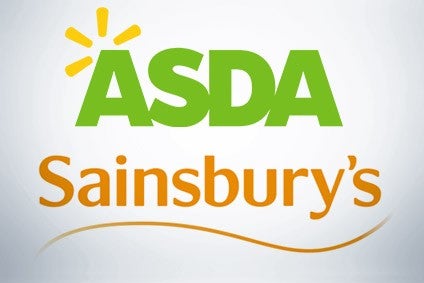
UK big four supermarkets Asda and Sainsbury’s have confirmed that synergies from their proposed merger are likely to come from re-negotiating deals with suppliers.
Walmart-owned Asda and Sainsbury’s have said that they will operate as separate businesses if the merger is green-lighted, prompting politicians to ask where savings are likely to be made, especially as the supermarket giants have committed to slashing the prices of best selling items by 10% post-deal.

Discover B2B Marketing That Performs
Combine business intelligence and editorial excellence to reach engaged professionals across 36 leading media platforms.
Appearing before the House of Commons environment, food and rural affairs select committee today (20 June), Asda CEO Roger Burnley and his Sainsbury’s counterpart Mike Coupe were grilled on whether suppliers were the ones who would pay the price for the proposed deal’s cost savings.
Committee chair Neil Parish MP said: “You are going to save money at the expense of people who supply you. You are going to extract pain on them – not just the Nestles of this world but smaller suppliers.”
He added: “It is a cut throat business out there but I know just whose throat you will cut.”
But Burnley said: “I would hotly dispute that this is a zero sum game. We need the supply base as much as they need retailers.”

US Tariffs are shifting - will you react or anticipate?
Don’t let policy changes catch you off guard. Stay proactive with real-time data and expert analysis.
By GlobalDataBurnley said a recent event with its suppliers had revealed a mood of “cautious optimism” but Parish suggested the suppliers were too frightened to say anything.
Burnley denied Parish’s suggestion that suppliers would end up paying for the 10% price cuts.
“We are not talking about a wholesale 10% reduction in the supply chain,” he said.
But he added: “We haven’t shied away from the fact that the majority of the synergies do come form aligning the two buying prices one of us is benefiting from but it is not creating a new low price.
“Where is the fairness in each of us paying a higher price for some brands?”
Sainsbury’s CEO Coupe also talked up the deal in terms of supply chain benefits.
“We believe the deal will be good for suppliers, ” he said.
But echoing Burnley’s point about a single price deal with suppliers post-merger, he said: “Weetabix makes 20p in the pound on its product. We don’t think it is unreasonable that the Asda/Sainsbury’s buying price should be the same.”
Burnley admitted that e-commerce giant Amazon’s move into groceries is one factor driving the proposed merger.
“It’s certainly a factor. They are one of the players making it a more competitive environment,” he said.
Coupe agreed. He said: “Amazon is 100 times the size of Sainsbury’s in terms of market capitalisation. That’s a company Sainsbury’s will have to compete with in the future.
“We have to become more competitive. Lidl and Aldi are huge global competitors who sell a more restricted range of products.”
The planned merged is being investigated by the UK’s Competition and Markest Authority. Asda’s Burnley suggested that its final verdict was unlikely to be delivered until the latter part of 2019.
The CMA has already published details of the more than 30 responses it has had from interested parties, many of whom are critical of the deal.





